No Justice for Eric Garner
The federal government has dropped its charges against officer Daniel Pantaleo. We shouldn't be surprised, says activist Kamau Franklin.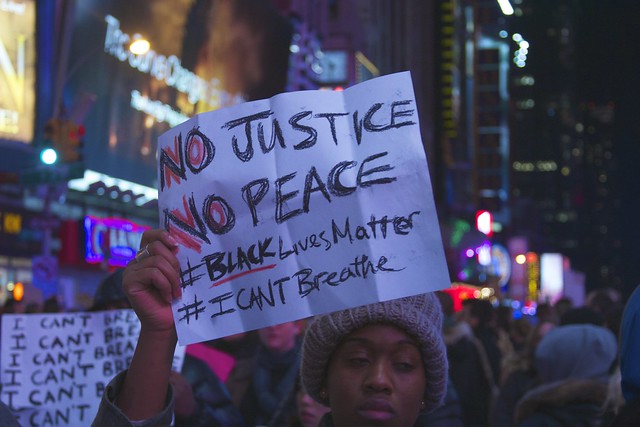 Paul Silva / Flickr
Paul Silva / Flickr
What follows is a conversation between activist Kamau Franklin and Marc Steiner of The Real News Network. Read a transcript of their conversation below or watch the video at the bottom of the post.
ERIC GARNER I told you the last time. Please just leave me alone.
NYPD OFFICERS [inaudible]
ERIC GARNER Take – left what? I didn’t sell anything.
BYSTANDER You tell him fam.
ERIC GARNER I did nothing. We sitting here the whole time, minding our business. Ya’ll touching me. And you want to grab me? [NYPD and GARNER scuffling]
BYSTANDERS Oh! Don’t do that. No! Damn man. Why they doing that to him? [scuffling continues]
ERIC GARNER I can’t breathe. I can’t breathe. I can’t breathe. I can’t breathe. I can’t breathe. I can’t breathe. I can’t breathe. …
MARC STEINER Welcome to The Real News Network. I’m Marc Steiner. That video just always shakes me to my core. Eric Garner was killed five years ago today, almost to the hour when we were taping this interview now. The day before the fifth anniversary of the death of Eric Garner at the hands of a police officer on Staten Island, Attorney General Barr through US Attorney for Brooklyn, Richard Donoghue, announced they were dropping the federal civil rights case against New York City Police Officer Daniel Pantaleo. All of us remember Eric Garner crying out, as you’ve just seen on this video, “I can’t breathe,” gasping for breath before he was killed. His death and others like his— Michael Brown, Tamir Rice, Trayvon Martin, Freddie Gray, Sandra Bland, all the others— led to the growth of the Black Lives Matter movement. The lack of justice for this killing and the others like it are what we have to talk about today.
We are joined by Kamau Franklin, who’s an attorney and founder of the community movement Builders, Inc. and joins us from Atlanta. And Kamau, welcome. Good to have you back with us here on The Real News.
KAMAU FRANKLIN Thanks for having me.
MARC STEINER I mean, as I watch this, you know, realizing this announcement came literally a day before the fifth anniversary. It was pretty, I won’t say shocking, but was still stunning to me and stopped me for a moment as I realized what was happening. Talk a bit about why you think what happened, happened.
KAMAU FRANKLIN Well, maybe stunning, but not unexpected, right?
MARC STEINER Right, right.
KAMAU FRANKLIN I think, you know, part of what happened in this case is that this, as you read off some of the names and there are names even before that— Sean Bell— others prior who’ve been killed by the police. And the norm has been that these police officers have either not been indicted, or in the rare cases that they have been, they’ve been acquitted at trials. So I think any organizer, any advocate, any attorney could not look at this and say that this was something that they did not expect based on the history of prosecutors, whether federal or at a state level, bringing charges against the police officers for excessive use of force. And as we say in the organizing and activist community: the system ain’t broke; this is how it is supposed to and/or intended to work.
MARC STEINER Well, I want to come back to that very thought. I want to share, as we’re talking about this, these two videos. The first one we’re going to look at right now is the district attorney announcing that there will be no civil rights trials.
US ATTORNEY RICHARD DONOGHUE While the department does not normally publicly discuss a decision not to bring charges, we felt that this matter is an exception because it means so much to our community and beyond. For the family to suffer as this family has for too long has only compounded the loss. But these unassailable facts are separate and distinct from whether a federal crime has been committed. And the evidence here does not support charging Police Officer Daniel Pantaleo or any other officer with a federal criminal civil rights violation.
MARC STEINER And we’ll explore what those mean in just a moment, but I want to also play at this moment for all of you the video of the family— mother and [daughter] of Eric Garner— and what they had to say after this announcement was made.
GWENN CARR, MOTHER OF ERIC GARNER Five years ago, my son said “I can’t breathe” eleven times. And today we can’t breathe because they have let us down. All the officers who was involved in my son’s death that day need to be off the force. The streets of New York City is not safe with them walking around. Five years ago, it was me. It was my family. Today or tomorrow it could be your family. You killed my son. And you won’t get away with it.
EMERALD SNIPES, DAUGHTER OF ERIC GARNER And they didn’t do they job. We called the Department of Justice. They didn’t do their job. So, no. I’m going to stand outside and I’m gonna scream it. Pantaleo needs to be fired! He needs to be fired! There is no waiting. There is no nothing. The statute of limitations ends tomorrow. Eric died 07/17/2014. We’re 07/16/2019. Five years later, and there’s still no justice. So no, there won’t be no calm. No, there won’t be no peace. No justice, no peace.
MARC STEINER So let’s start, Kamau, with what happened earlier in the first video when the US Attorney said that there’s no federal crime committed, there’s no evidence of a federal crime being committed. So let’s talk about that from your perspective, and what the other side of that story is.
KAMAU FRANKLIN Yeah. I think that’s patently untrue. This was a chargeable offense. The federal prosecutor would have to show that the officer willfully used excessive force in violation of Mr. Garner’s civil rights. I think the video evidence is clear that that officer applied a chokehold to Mr. Garner, took him down on a chokehold, a chokehold which is banned in New York, has been banned for over two decades. After he released the chokehold, he immediately put his knee on top of his neck and his hand on top of his head, applying pressure that continued the same type of pressure that was at when the chokehold was on hold, causing a reaction that led to his death.
The federal prosecutors throughout the history of this case—And this case goes back to the Obama era with Eric Holder and then Brooklyn Federal Attorney Lynch. They had a back and forth about whether or not to prosecute, and Holder wanted to prosecute and Lynch at the time did not. And later when Lynch took Holder’s place, she did decide then to enter into a prosecution stage in this particular case. And obviously after the election of Trump, nothing was done until now at the end of the statute of limitations. And then Barr makes this callous announcement through the Justice Department— Barr being the Attorney General— that they would not bring any civil rights charges against the officer.
MARC STEINER So, you know, before we go to the family and what this portends as well. I mean, staying with us for a moment. It would be easy for us to sit here and go, oh this is Trump putting out his new US Attorney for Brooklyn, this is all Barr’s doing. But the reality is, as you alluded to a moment ago, this does go back to the Obama administration because of the internal arguments there between the Civil Rights Division and the rest of the Justice Department of whether or not to prosecute. And Lynch was there but she came back and became the Attorney General and allowed it to go on, but it still didn’t open it up. So, I mean, I thought—
KAMAU FRANKLIN I think this goes back to, I’m sorry, but this goes back to what we talked about earlier, you know, we can go to the Bush era. You can go back to the Clinton era.
MARC STEINER Right. Right.
KAMAU FRANKLIN The history of federal prosecutions is basically nil. And as we spoke about a little earlier, the last time there was a federal prosecution of this kind of case was over 20 years ago. And that was the Anthony Baez case where he was placed in a chokehold by Officer Francis Livoti and was convicted on civil rights charges. So very similar in some ways to this particular case, but a different outcome.
MARC STEINER So you were involved in that as an organizer back in the late 90s when that happened. So what’s the difference? Is this because the Baez case was just an anomaly, that these things never happen? I mean, you know, the Civil Rights Division got involved when people were killed in the South sometimes doing the Civil Rights Movement, but not much beyond that. Never in the other things that ever happened down there. So was Baez an aberration? And if it was an aberration, what does that mean? What has to change? How do you change it?
KAMAU FRANKLIN I certainly do think it was an aberration. I think the history shows that 20 years later, if no other police officer around the country could be convicted on civil rights charges for killing unarmed black men in particular, then it shows that this was something that took place at a special time, a special place, with the right evidence that allowed this prosecution to go through and for this conviction to happen. But under other circumstances, cases that had videotape evidence, cases that had eyewitness evidence, these types of prosecutions either weren’t pursued at all again, either at the federal level or at the state level. And when they were pursued at the state level, they ended in acquittals either by a jury or by a judge. And that speaks to how the system works.
The system works to protect police officers through the prosecution system, through the judicial system, because these folks work day to day with these police officers. These are the folks who gather evidence for them. These are the folks who they hold up high as the protectors of stopping criminal activity and so forth. And so, the justice system, the so-called justice system, the so-called judicial system, does not want to be seen in their estimation as anti-police. And prefer to be seen as pro-police even if that means that they look anti-black because they can handle an anti-black sentiment, but they can’t handle, in their own estimation, not being considered part of the good ol’ boy system.
MARC STEINER So, I mean, it’s never easy to prosecute and convict police. We saw that happen here in Baltimore with the Freddie Gray instance. We’ve seen it in all the other instances that take place around this country. It’s always a very difficult process. But rising out of this and the other murders that took place at the hands of the police, was the Black Lives Matter movement. And it seems as if—I’m thinking about Garner’s family and how they responded, and it seems as if on a larger national scale since Trump was elected, whatever the juxtaposition of events were or are, that that movement— decentralized as it is and was— isn’t out in force as it was, while these things are still going on.
KAMAU FRANKLIN No, I think that’s correct. I think, you know, I guess there’s a lot of internal struggles that happen in terms of the centralization of that movement or not. And let’s remember the Black Lives Matter movement came from organizers, but it came from folks who were not directly involved in the local organizing at the time that the hashtag took on. And so you had local organizers who were in the street on these cases and who brought the attention needed. And then you had the hashtag that gave it more of a national feeling of resistance through these types of issues and that did involve organizers who then would go on the ground when these cases took place. But I think, you know, again in terms of their own internal contradictions, but I think in addition to that, the not having real clear victories, the election of Trump, really just took the sting out of what would be considered somewhat of an umbrella movement of forces.
And so today I think what you need again is that local organizing that’s done at a fever pitch that really puts some pressure on these police officers and the judicial system. But I just want to say that I don’t know if that’s enough at this stage, right? Because it’s not like that hasn’t been done before. So organizers have been in the streets trying to get justice. We just have a broken—We have a system that was setup to work a certain way, and it protects those police officers, and that’s how that system works. There might be every now and then some individual cases of justice, but it is a hard, long struggle to get real justice out of this system.
MARC STEINER And I think the responses around the country have been very local. I mean, it happened here in Baltimore, other cities I’m aware of, where movements like here when Tyrone West was killed by police officers. His family for the last several years every Wednesday, have had “West Wednesdays” and they’re out in the street reminding people this has happened and we have to change things. And so the question then as we close is, you know, as you look at the anniversary of Eric Garner’s death, we see this horrendous video as Eric Garner died at the hands of the police officers, the movement is still there on some levels. The question is, what is the political response now given the world we’re facing, the election coming up? How do you think all this fits in?
KAMAU FRANKLIN I think a lot of this has to do, I mean, this is a larger question and issue in some ways. But the ideological output of organizers here in the United States is different than other places in the world. And what I mean by that is the sustained, in-the-street movements that folks have in other places is not something that is part and parcel these days to organize our activities. Organizing activities, they may last one or two days. If you get longer than that, you’re lucky.
So I think there’s got to be a better shift. There’s got to be a bringing together of national interests in organizations to really make some hard pushes. But, you know, it’s an uphill battle because again, I think that you’re dealing with a so-called justice system that works to protect the police officers, that works to protect judges, that works to protect criminal investigations on black people and other folks of color, immigrants and so forth, because it feels like it’s protecting white interests in some ways. It feels like it’s protecting moneyed interests in some ways. And that battle is something that is long to be fought, and I don’t see a clear breakthrough coming anytime soon unfortunately.
MARC STEINER And I should have said this at the top, but I did not. Just to remind folks that Officer Pantaleo—The internal investigation was done, the report’s not been released, people are calling on de Blasio— the Mayor of New York— to throw him off the force at the very least. And so, that piece is still happening, and we’ll see what happens with that in the coming week or two when that goes on. And I want to thank you, Kamau Franklin, for taking your time with us once again here at The Real News. And obviously, this is one of the issues that we’re going to stay on top of. Thank you so much.
KAMAU FRANKLIN Thank you. Thank you for having me.
MARC STEINER And I’m Marc Steiner here for The Real News Network. Thank you for joining us. Take care.
Your support matters…
Independent journalism is under threat and overshadowed by heavily funded mainstream media.
You can help level the playing field. Become a member.
Your tax-deductible contribution keeps us digging beneath the headlines to give you thought-provoking, investigative reporting and analysis that unearths what's really happening- without compromise.
Give today to support our courageous, independent journalists.
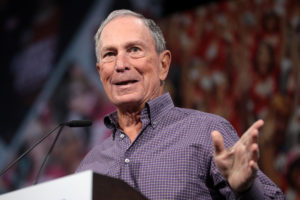

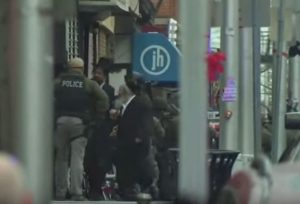
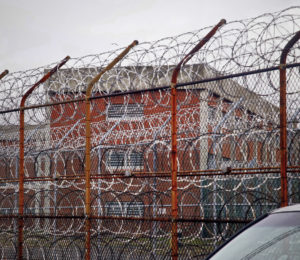
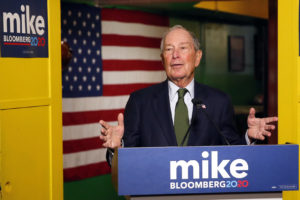

You need to be a supporter to comment.
There are currently no responses to this article.
Be the first to respond.